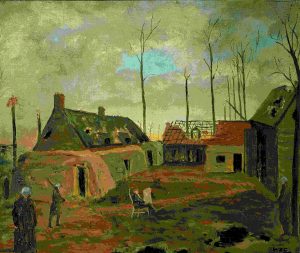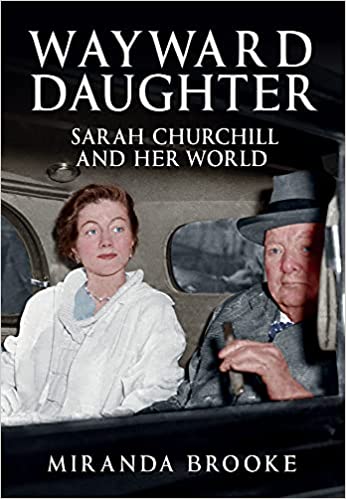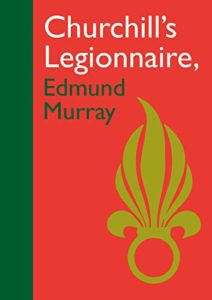
Finest Hour 194
Books, Arts, & Curiosities – Dazed and Confused

August 30, 2022
Finest Hour 194, Fourth Quarter 2021
Page 47
Miranda Brooke, Wayward Daughter: Sarah Churchill and Her World, Amberly, 2021, 384 pages, £25.
ISBN 978–1398107403
Review by David Freeman
David Freeman is editor of Finest Hour.
There was never anyone quite like Sarah Churchill. She crossed over from the remarkable personal and political world of her father Winston Churchill to the equally remarkable world of twentieth-century Hollywood. At the apex of her acting career, she co-starred with Fred Astaire in Royal Wedding, a big-budget musical filmed in color. Released in 1951 in Britain as Wedding Bells, the story takes place in 1947 at the time of the wedding of Princess Elizabeth to Prince Philip. That marriage lasted seventy-three years, six years longer than Sarah lived.
Sarah’s unique story began on 7 October 1914, two months into the First World War, when her father was First Lord of the Admiralty. During the first few months of his third child’s life, Winston Churchill experienced the greatest crisis of his political career, as he moved in the public’s perception from the mastermind who had successfully prepared the Royal Navy for war to the scapegoat for the Gallipoli disaster. The broad arc of Sarah’s life mirrored this year in that of her father’s: from shining star to tarnished legacy.

2024 International Churchill Conference
Since her papers were opened for research by the Churchill Archives Centre a few years ago, Sarah Churchill has been an important subject in two books: last year’s brilliant The Daughters of Yalta and this year’s The Churchill Girls (reviewed in FH 190 and 192 respectively). Miranda Brooke is the first, however, to give us a full biography dedicated to Sarah alone. The attention is well deserved.
Not for Sarah was the life of a debutante raised to make a good marriage and thereafter serve exclusively as a supportive wife and mother. She set her eyes on a stage career, and nothing could stop her. Her parents recognized her stubborn streak when they nicknamed her “the Mule.” Sarah’s headstrong approach to life led her into two marriages that those around her viewed as doomed from the start because in fact they were. Yet her determined attitude also resulted in a reasonably successful life in show business, no easy accomplishment at any time.
As happened to millions of other people, Sarah’s career became sidetracked by the Second World War. She joined up and served in the complex and demanding field of photo-reconnaissance analysis. Twice during the war, she was seconded to serve as ADC to her father. These were no ordinary occasions. The first took place in late 1943 when the Prime Minister went to meet President Roosevelt and Marshal Stalin in Teheran. On the journey home, Winston became quite seriously ill and had to remain for weeks in North Africa. Sarah was the one family member on the scene throughout the ordeal who could comfort her father while he convalesced.
Sarah’s second wartime assignment to her father’s staff was no less dramatic than the first, for it was the second and final meeting of the Big Three during the German war. The surreal experience of the Yalta Conference, when a dying Roosevelt journeyed halfway around the world in an essentially pointless effort to “negotiate” with Stalin, meant that Sarah became the confidante not only of her frustrated father but of several others in the Anglo-American delegations. It was also Sarah who accompanied Winston on his first holiday after the war immediately following his emotionally crushing defeat in the 1945 general election.
Peacetime brought a resumption of Sarah’s show business career, and for about a dozen years she excelled. The advent of television created a new demand for actors that worked to her advantage. In addition to films, Sarah appeared in many television dramas in the 1950s, almost all of which were broadcast live. She also worked the theater circuit in the United States. Along the way, however, she fell victim like many other people in that era to the two forms of “medication” often utilized by the overstressed: barbiturates and alcohol. Her career derailed and never recovered.
Sarah finally struck lucky in her third marriage, which was to the twenty-third Baron Audley in 1962. Only a year later, however, Audley suddenly died at age forty-nine. There followed the equally tragic death of her older sister Diana only four months later and the loss of her beloved father in January 1965. By that time, alcoholism had completely consumed Sarah, leading to many painful experiences for her family.
Although she never overcame her addiction, Sarah still managed in her later years to produce two beautifully written volumes of memoirs and develop her talents as a commercial artist. She seemed to be everyone’s favorite aunt, and, when she died of liver failure in 1982, the shopkeepers of her neighborhood turned out in force at the memorial service, because she also seemed to be everyone’s favorite client, even if she did inherit the Churchill habit of being slow to settle her debts.
Brooke has done an extraordinary amount of research and provides exhaustive details about Sarah’s acting career. Yet this book needed much stronger editing than the publisher provided. Brooke begins Sarah’s story in medias res with the very public arrest in Los Angeles in 1958 that marked the start of her downfall. The structure of the narrative, such as it is, haphazardly ranges back and forth over time from there. After two full chapters, Brooke still has not got down to the basics of when, where, and under what circumstances Sarah was born.
The kaleidoscopic life of Sarah Churchill deserves a strong biography. Brooke fleshes out many of the details, but an overly familiar style (she frequently refers to Winston and Clementine as “Dad and Mum”) and a bewildering narrative that jumps like quicksilver from one subject to another on every page leaves the reader feeling whipsawed and confused. As with her father, there is room for more than one telling of Sarah’s inimitable story.
Subscribe
WANT MORE?
Get the Churchill Bulletin delivered to your inbox once a month.




